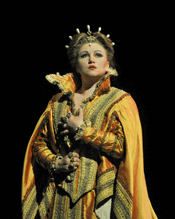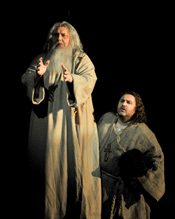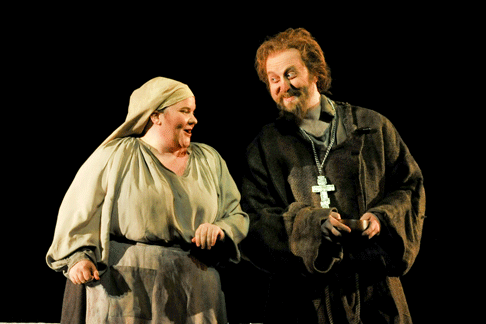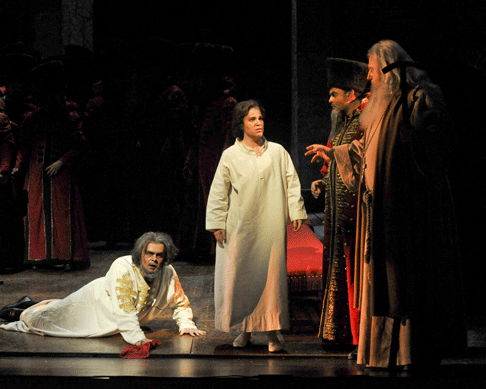The films — Solaris, allegedly a reaction to Kubrick’s
2001, and Stalker, a major meditation in science fiction — were
the work of Andrei Tarkovsky, then widely celebrated as the greatest genius of
Russian film since Eisenstein.
 Elena Bocharova as Marina Mnishek
Elena Bocharova as Marina Mnishek
Today, alas, Tarkovsky seems largely forgotten despite a
further pair of masterpieces made after his defection from the then-still
Soviet Union: Nostalghia [sic], made in Italy in 1983, and
Sacrifice, in Sweden, in 1986, the year of his death. (For the latter
he had the help of several Ingmar Bergman regulars.)
It was also in 1983 that Tarkovsky directed Boris Godunov at Covent
Garden, and Dallas Opera is to be praised — and thanked — for
bringing this production to its Winspear Opera House to conclude its current
season. Stephen Lawless, who recreated the London staging in Dallas, had been
Tarkovsky’s assistant at Covent Garden. His essay in the Dallas program
is a tribute — both fitting and moving — to this late master.
(Tarkovsky, by the way, had been the choice of Claudio Abbado who conducted the
British Boris.)
Lawless speaks of this Boris as the product of “a unique
apostolic succession of Russian artists,” pointing out that while
Tarkovsky was influenced by Eisenstein, Eisenstein, in turn, was inspired by
the epic sweep of Boris. Mussorgsky, of course, turned for his
libretto to Pushkin, the father of Russian literature who had defined the
Russian language.
 Vitaly Efanov as the monk/historian Pimen and Evgeny Akimov as Grigory
Vitaly Efanov as the monk/historian Pimen and Evgeny Akimov as Grigory
This revival of Tarkovsky’s Boris might well have run aground
on so much scholarship, but — happily — it did not, thanks largely
to Lawless’ understanding — and appreciation — of the
heritage of which he became a part in his work with this production. For it,
designer Nicholas Dvigubsky has built a single set focused on a huge arch at
the rear of the stage. All action flows through it. Still a work in progress,
it arises out of the debris of earlier projects.
In the Coronation Scene a bell is suspended from the arch; at other times a
huge ball swings ominously behind it. The people, the helpless victims of
history, reside largely in darkness before the arch. A profound expression of
his views, the set magnificently complements the counterpoint of the personal
and political at the heart of Tarkovsky’s concept.
Born in 1932, he experienced the worst of history: the terror and
deprivation of the Stalin years, the sufferings of the Great Fatherland War
— as the Russians called it — and the Orwellian machinations of the
post-war era. (Small wonder that — once permitted to work in the West
— the director chose not to return home, even though it meant separation
from his only child for his remaining years.) His Boris is both a
loving father and — no matter how he got there — a leader who would
be just. But — as Bert Brecht said — “the conditions just
aren’t right.” Surrounded by petty ambition on all sides, he can
only fail.
 Meredith Arwady as the cheeky Hostess of the Inn shares a lighter moment with Mikhail Kolelishvili as Varlaam, a vagabond monk.
Meredith Arwady as the cheeky Hostess of the Inn shares a lighter moment with Mikhail Kolelishvili as Varlaam, a vagabond monk.
One might wish that the production — “Boris” is presented
largely as Mussorgsky intended- ended with the agonized death of the tsar, but
that would leave him a sympathetic — even tragic — hero. Thus the
lengthy final scene with the people — defeated again in their hopes
— gather around the Simpleton — a “holy fool” in
Russian — who removes his hood to stare at a shining apparition of a
better world high on the stage. Tarkovsky’s view of the hopelessness of
history make this a shattering — and uncomfortably contemporary —
experience.
This extensive description of the production — seen on many stages
since it was new — in no way overlooks the musical excellence —
indeed, the musical perfection — achieved in Dallas. As its conductor DO
music director Graeme Jenkins has raised his orchestra to a new level of
richness and technical ease, and it must be his growing international
reputation that accounts for the assembly of a mostly-Russian cast without one
weak link. (Most were making Dallas Opera debuts.)
 The mad Tsar Boris (Mikhail Kazakov), sensing that death is imminent, prepares his son (Rebecca Jo Loeb) to assume the throne.
The mad Tsar Boris (Mikhail Kazakov), sensing that death is imminent, prepares his son (Rebecca Jo Loeb) to assume the throne.
Mikhail Kazarov was a Boris of unusual depth and warmth. He brought grandeur
to the Coronation and made his later suffering near-palpable to the audience.
Tenor Yevgeny Akimov moved the growing ambition and shifting fate of pretender
Dmitri beyond theatrics, while in her selfish lust for power mezzo Elena
Bocharova made Lady Macbeth an amateur. Bass Vitaly Efanov’s account of
Russian history from Pimen’s chronicle radiated lyric beauty, and Sergei
Leiferkus — the only member of the cast previously well known in the US-
was an appropriately cunning Jesuit Rangoni. In this august constellation tenor
David Cangeloni acquitted himself admirably as Shuisky, Boris’ No. 1
enemy among the Boyars. For his preparation of the many and massive chorus
scenes Alexander Rom would win acclaim at the Bolshoi, and Melinda Cotton had
the kids of the Opera’s Children’s Chorus singing Russian as if it
were Texan slang.
In sum, an extraordinary performance of a production of Boris so
earth-shaking that — one hopes — it will survive many more decades
in the world’s opera houses.
Wes Blomster
image=http://www.operatoday.com/BG_13.gif
image_description=Mikhail Kazakov as Boris Godunov [Photo © Karen Almond, Dallas Opera]
product=yes
product_title=Modest Mussorgsky: Boris Godunov
product_by=Boris Godunov: Mikhail Kazakov; Marina: Elena Bocharova; The Pretender: Yevgeny Akimov; Pimen: Vitaly Efanov; Varlaam: Mikhail Kolelishvili; Rangoni: Sergei Leiferkus; Shuysky: David Cangelosi; Xenia: Oxana Shilova; Shchelkalov: Andrei Spekhov; The Hostess: Meredith Arwady; A Simpleton: Keith Jameson; Missail: Steven Haal; Fyodor: Rebecca Jo Loeb; A Nurse: Susan Nicely; Nikitich, a police officer: Mark McCrory; Mityukha: Stefan Szkafarowsky; Boyar-in-attendance: Aaron Blake; Khrushchov: Dan Crowell. Conductor: Graeme Jenkins. Original Production: Andrei Tarkovsky. Stage Director: Stephen Lawless. Production Designer: Nicolas Dvigubsky. Lighting Designer: Robert Bryan. Choreographer: Nicola Bowie. Chorus Master: Alexander Rom. Assistant Director: Matthew Ferraro. Children’s Chorus Master: Melinda Cotten. Dallas Opera; Winspear Opera House, April 9, 2011.
product_id=Above: Mikhail Kazakov as Boris Godunov
Photos © Karen Almond, Dallas Opera